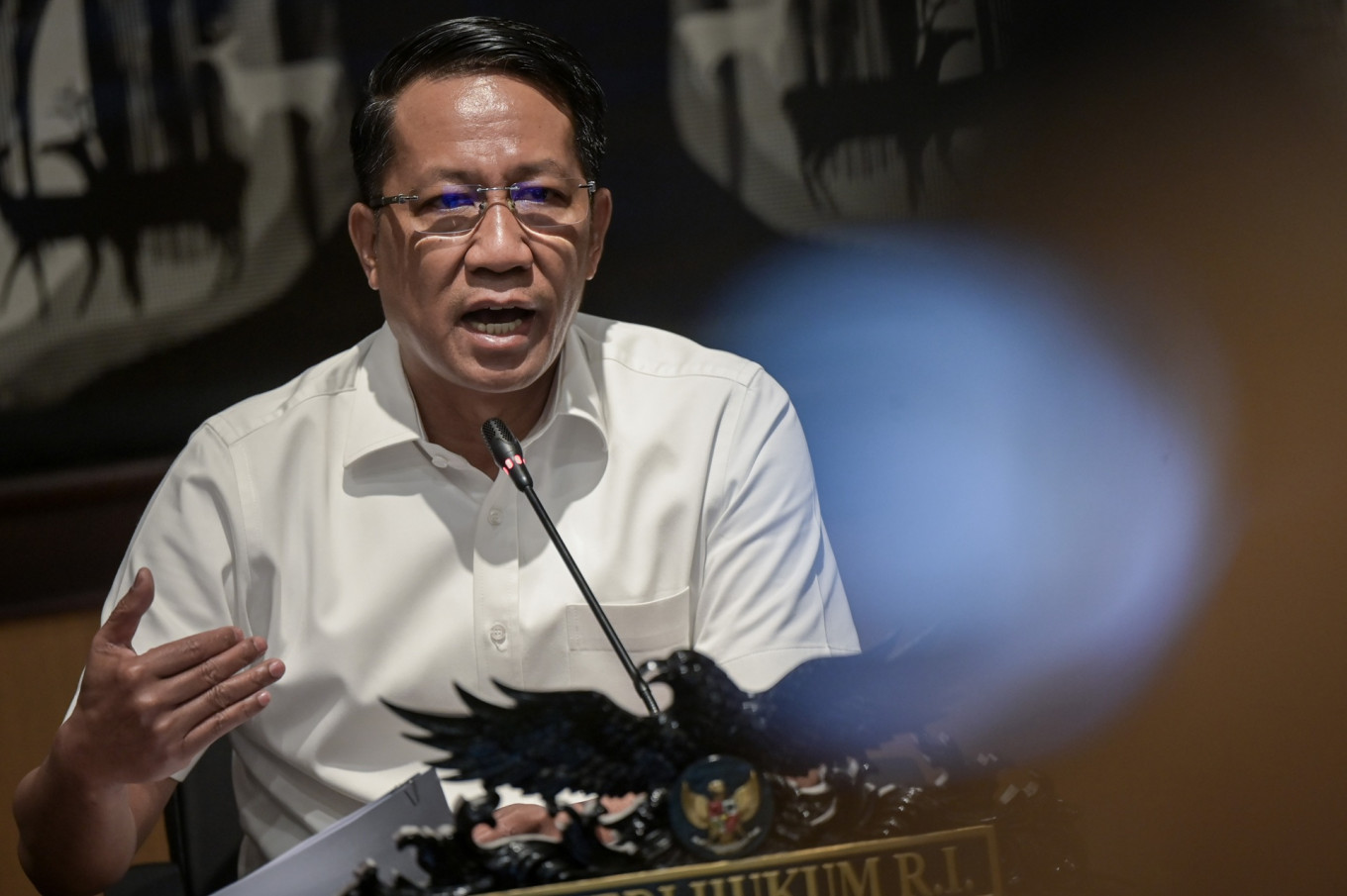Popular Reads
Top Results
Can't find what you're looking for?
View all search resultsPopular Reads
Top Results
Can't find what you're looking for?
View all search resultsExtradition or escape?
Change text size
Gift Premium Articles
to Anyone
 Law Minister Supratman Andi Agtas speaks to journalists during a press briefing in Jakarta on Jan. 29, 2025, about the citizenship of Paulus Tannos, an Indoensian businessman named suspect in an e-ID corruption case. The minister reasserted Paulus' Indonesian citizenship, solidifying the law enforcement institutions' authority to arrest and extradite him from Singapore. (Antara/Fauzan)
Law Minister Supratman Andi Agtas speaks to journalists during a press briefing in Jakarta on Jan. 29, 2025, about the citizenship of Paulus Tannos, an Indoensian businessman named suspect in an e-ID corruption case. The minister reasserted Paulus' Indonesian citizenship, solidifying the law enforcement institutions' authority to arrest and extradite him from Singapore. (Antara/Fauzan)
T
he recent developments surrounding the extradition order for fugitive businessman Paulus Tannos have cast a spotlight on the efficacy of the Indonesia-Singapore Extradition Treaty.
Tannos, implicated in a massive graft scandal involving Indonesia’s electronic identification (e-ID) card project, is currently contesting his extradition from Singapore.
This situation raises critical questions about the potency of the treaty and the commitment of both nations to combating corruption.
Singapore’s Law and Home Affairs Minister Kasiviswanathan Shanmugam has stated that the country is processing Indonesia’s extradition request for Tannos and is committed to expediting the process.
However, the fact that Tannos has been able to contest the extradition raises concerns about potential loopholes within the treaty that fugitives could exploit.
The Indonesia-Singapore Extradition Treaty, which came into force in March 2024, was hailed as a significant milestone in bilateral relations.
It was expected to enhance cooperation in combating transnational crimes, particularly corruption and money laundering. The treaty includes provisions for the extradition of individuals involved in 31 types of criminal offenses, including corruption, with a retroactive effect of 18 years.
Despite these robust provisions, the Tannos case exposes potential vulnerabilities in the treaty’s implementation.
Tannos, who has been residing in Singapore since 2017 and holds permanent residency there, was arrested by Singapore’s Corrupt Practices Investigation Bureau in January following a request from Indonesia. He is accused of colluding with lawmakers and officials to secure a contract for his company at an inflated price, causing significant financial losses to the Indonesian state.
While Singapore’s authorities have expressed their commitment to processing the extradition, the legal proceedings have been prolonged because of Tannos’s contestation. This situation underscores the challenges inherent in extradition processes, even under treaties designed to facilitate swift justice.
It also raises concerns about the potential for fugitives to exploit legal avenues to delay or evade extradition.
The Tannos case serves as a litmus test for the effectiveness of the Indonesia-Singapore Extradition Treaty. If Tannos successfully evades extradition, it could set a concerning precedent, signaling to other fugitives that the treaty can be circumvented. This outcome would undermine the treaty’s intended purpose and weaken both nations’ efforts to combat corruption.
Furthermore, this case highlights the importance of political will and cooperation between nations in enforcing extradition treaties. While legal frameworks are essential, their effectiveness largely depends on the commitment of the involved parties to uphold the spirit of the agreement.
Any perception of reluctance or inconsistency in enforcing the treaty could erode public trust in the government’s commitment to eradicating corruption.
Indonesia has faced challenges in the past with fugitives finding refuge in countries without extradition agreements, hindering anti-corruption efforts. The treaty with Singapore was expected to close such loopholes, but the current situation suggests that more needs to be done to ensure its effectiveness.
In light of these developments, it is imperative for the Indonesian government to reassess the extradition treaty’s provisions and address any weaknesses that could be exploited by fugitives.
This should involve a thorough review of the legal processes and timelines associated with extradition requests to prevent undue delays.
Additionally, Indonesia must strengthen its domestic legal and investigative frameworks to ensure that extradition requests are supported by comprehensive and compelling evidence. This approach would minimize the chances of fugitives successfully contesting extradition on procedural or evidentiary grounds.
For Singapore, upholding its commitment to the treaty is crucial in maintaining its international reputation as a nation that does not tolerate corruption. While due process is essential, it should not be manipulated to shield individuals from facing justice for serious crimes.
The Tannos case also serves as a reminder of the broader challenges in combating transnational corruption. It underscores the need for continuous collaboration and mutual trust between nations to ensure that legal instruments like extradition treaties function effectively.
As Indonesia and Singapore navigate this complex case, their actions will be closely watched by the international community.
A successful extradition would reinforce the message that there is no safe haven for corrupt individuals.
Conversely, failure to enforce the treaty effectively could embolden other fugitives and undermine regional anti-corruption initiatives.










